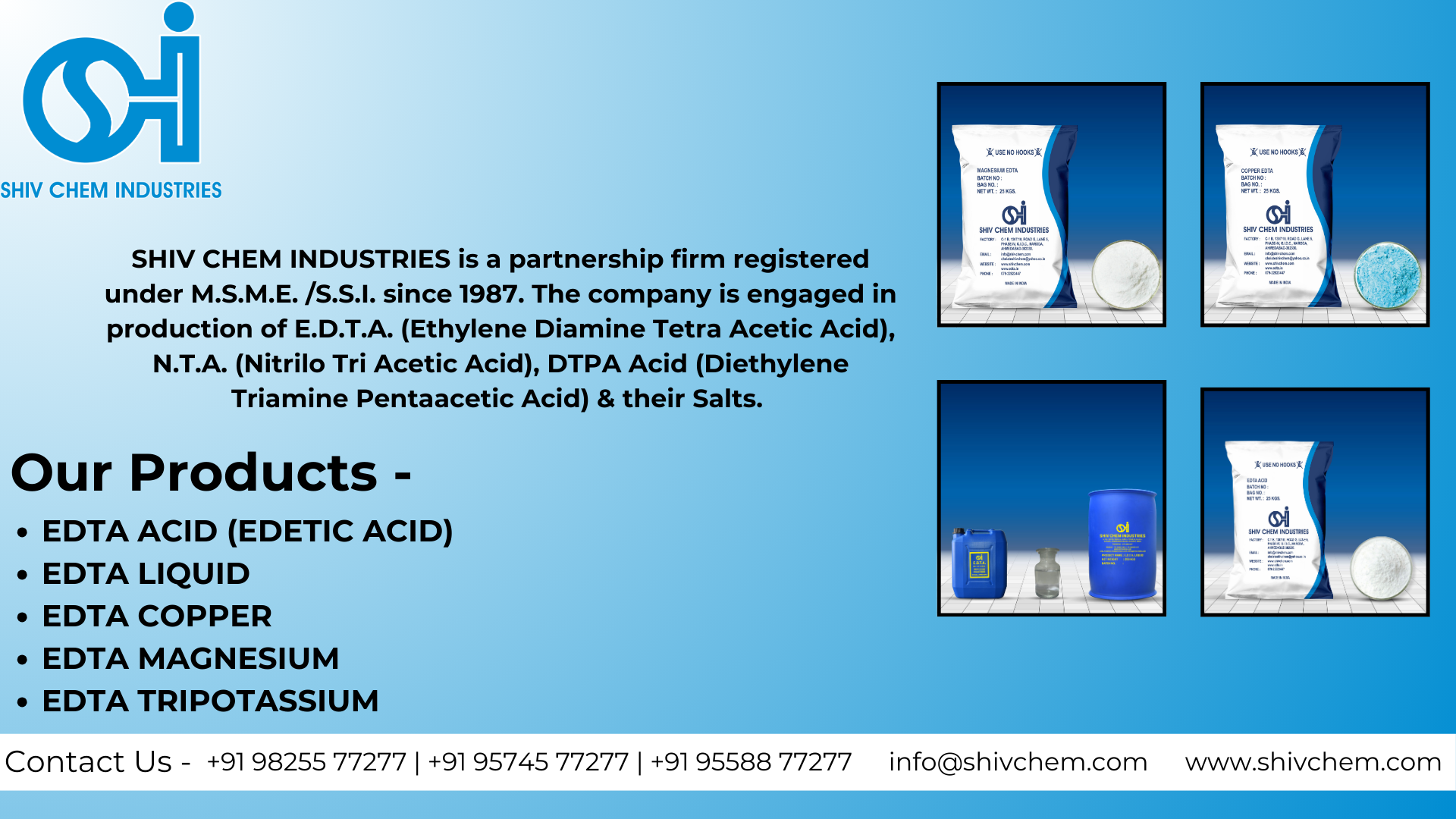
EDTA Acid (Ethylenediaminetetraacetic Acid)
EDTA Acid (Ethylenediaminetetraacetic Acid)
What is EDTA Acid?
EDTA (Ethylenediaminetetraacetic acid) is a chelating agent—meaning it binds to metal ions, forming stable, water-soluble complexes. It appears as a white, odorless, crystalline powder, slightly soluble in water. Its primary role is to "trap" metal ions, preventing them from participating in unwanted chemical reactions.
Notable Manufacturer Characteristics
-
ISO-certified production facilities
-
Advanced quality control
-
Environmentally sustainable processes
Applications of EDTA Acid
1. Industrial Uses
-
Water Treatment: Prevents scale and corrosion by binding calcium and magnesium ions.
-
Textile Industry: Acts as a sequestering agent in dyeing processes.
-
Pulp and Paper: Improves bleaching by sequestering metal ions.
2. Pharmaceutical
-
Used as a preservative and stabilizer in injectable medicines.
-
Chelating agent in heavy metal poisoning treatment (e.g., lead, mercury).
3. Food Industry
-
Labeled as E385, used to stabilize color, flavor, and prevent spoilage in canned foods, mayonnaise, and dressings.
4. Cosmetics and Personal Care
-
Found in shampoos, creams, and lotions to enhance stability and shelf life.
-
Prevents metal ion contamination that causes product degradation.
5. Agriculture
Key Features of EDTA Acid
-
Chelating Capability: Binds with metal ions like calcium, iron, and magnesium.
-
Stability: Chemically stable over a wide pH range.
-
Non-toxic (at low concentrations): Safe for use in cosmetics and food.
-
Solubility: Moderate water solubility; enhanced in salt forms (e.g., Na2EDTA).
-
Compatibility: Works well with various formulation types.
Importance and Significance
-
Environmental Impact: Helps in remediation of heavy metals from wastewater and contaminated soil.
-
Health Applications: Essential in detox therapies and pharmaceutical preservation.
-
Industrial Efficiency: Increases efficiency in dyeing, bleaching, and water treatment by reducing metal ion interference.
-
Food Quality: Maintains freshness and quality of processed foods.
-
Agricultural Growth: Increases micronutrient uptake efficiency in plants.
Advantages of Using EDTA Acid
-
Prevents Metal-Induced Deterioration: Inhibits oxidative damage.
-
Versatile: Functions across multiple industries.
-
Safe in Controlled Doses: Approved for use in cosmetics and food.
-
Stable Complexes: Long-lasting chelation properties.
-
Cost-Effective: Reduces maintenance and downtime in industrial systems.
Frequently Asked Questions (FAQs)
Q1: Is EDTA environmentally safe?
In small, regulated quantities, EDTA is considered safe. However, excessive use can pose environmental concerns due to its persistence and ability to mobilize heavy metals in soil and water.
Q2: What are the forms of EDTA available?
EDTA is sold as:
-
Disodium salt (Na2EDTA)
-
Tetrasodium salt (Na4EDTA)
Q3: How is EDTA used in cosmetics?
It stabilizes formulations by binding trace metal ions that can destabilize products or cause rancidity.
Q4: Can EDTA be used in organic farming?
Generally no, because EDTA is synthetic. However, some chelating agents like EDDS are preferred alternatives for organic farming.
Q5: Is EDTA safe in food?
Yes, EDTA (E385) is approved in the EU and US in limited concentrations to maintain food quality, especially in canned or processed items.
Q6: How is EDTA stored and handled?
It should be stored in a cool, dry place away from strong oxidizers. Proper protective equipment should be used during handling in industrial settings.
conclusion
EDTA acid is a highly versatile and widely used chelating agent across numerous industries, including pharmaceuticals, food processing, cosmetics, agriculture, and industrial manufacturing. In Europe, its production is supported by advanced chemical companies operating under stringent regulatory standards, ensuring quality, safety, and environmental compliance.
Contact:-+91 9825312613, +91 98255 77277 , 079 22823447, +91 9558877277, +91 9574577277
Gmail:-Chelateshivchem@yahoo.co.in
Website:-https://shivchem.com/

Get In Touch
C-1/B, 1307/10, Road-G, Lane-5, Phase-IV, GIDC, Naroda, Ahmedabad-382330, Gujarat, INDIA.
Chelateshivchem@yahoo.co.in
info@shivchem.com
+91 9825312613, +91 98255 77277
079 22823447, +91 9558877277, +91 9574577277
Links
PRODUCTS
SHIV CHEM INDUSTRIES
